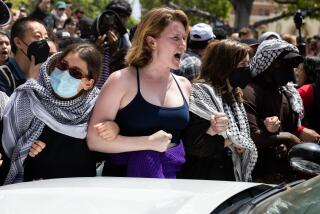Fighting the War as a Study in Nonviolence
- Share via
Wavy Gravy, the only humanitarian clown ever to have an ice-cream flavor named after him, met Allen Ginsberg in 1957. “I was a teenage beatnik,” says Gravy. “Ginsberg was a little wilder. Eventually, he became a statesman-poet, but he always had that mischievous glimmer. He could be outrageous even in his geezerhood.”
In 1965, the late Jerry Rubin, who helped organize the first Vietnam teach-in at UC Berkeley, met Ginsberg at an antiwar demonstration. They met again in 1967, at the Human be-in in San Francisco’s Golden Gate Park, a “gathering of the tribes.” This was a seminal event in countercultural history, which Rubin tried to politicize.
A year later, when Abbie Hoffman, Gravy, Rubin and myself, among others, co-founded the Yippies--a cross-fertilization of stoned hippies and political activists, joined at the hip by a hunger for justice--it was only natural that we would contact Ginsberg, the public personification of that coalition.
Early in March 1968, a press conference was held in the plush assembly room at the Americana Hotel in New York City, ostensibly for the purpose of announcing Judy Collins’ new album--but it was the media version of a Trojan horse, providing a venue for the Yippies to officially proclaim their existence and simultaneously announce their intention to protest the war at the Democratic National Convention in Chicago that summer.
I was one of the speakers. When a reporter asked me why the Yippies weren’t supporting peace candidate Eugene McCarthy for president, I explained that, although there was no Yippie party line, it was our policy not to support any candidate. Then I poked fun at the McCarthy Clean-for-Gene campaign, pointing out that “Allen Ginsberg wouldn’t even be allowed to ring anybody’s doorbell unless he agreed to shave off his beard.” The reporter asked, “Would you cut your hair if it would end the war?” Before I could answer, Ginsberg popped up like a Zen-master Jack-in-the-box, his index finger waving in the air, and asked the reporter, “Would you let your hair grow if it would end the war?”
Ginsberg talked at length later at the press conference. He spoke with the samepassion and precision that he used when he wrote poetry. “The planet Earth is endangered by violence, overpopulation, pollution, ecological destruction brought about by our own greed.” he said. “It is a planetary crisis that has not been recognized by any government of the world. The younger people of America are aware of that with psychedelic consciousness. We are going to gather together--as we had before in the San Francisco human be-in--to manifest our presence over and above the presence of the more selfish elder politicians who are not thinking in terms of what their children will need in future generations. . . . Since the younger people know that, we are going to invite them to Chicago, and the central motive is a presentation of a desire for the preservation of the planet.”
Ginsberg once told me, “I’m convinced that world peace is attainable--if only John F. Kennedy and Nikita Khrushchev would take LSD together.” This was, of course, a slight case of projection. But he was deeply committed to nonviolence. In fact, he often acted as a mediator at Yippie meetings where our counterconvention, the Festival of Life, was being planned. “I’m worried,” he said, “whether the whole scene will get violent. I’m worried whether the government will allow us to do something that is funnier or prettier or more charming than what’s going to happen in the convention hall.”
As things turned out, what happened in the streets of Chicago would be officially labeled “a police riot.” But there is one image, in particular, that remains vivid in my memory: Ginsberg serving as the Yippies’ battlefield chaplain, chanting in the park for several hours in the midst of chaos. It made Abbie Hoffman cry.
No wonder, when I called Gravy to commiserate over Ginsberg’s death last week, he answered the phone, “Good grief.”
More to Read
The biggest entertainment stories
Get our big stories about Hollywood, film, television, music, arts, culture and more right in your inbox as soon as they publish.
You may occasionally receive promotional content from the Los Angeles Times.










